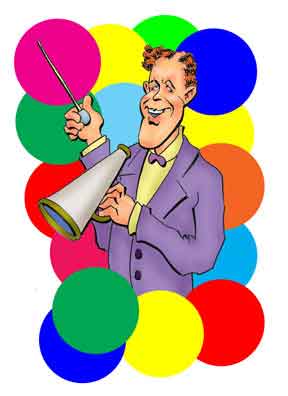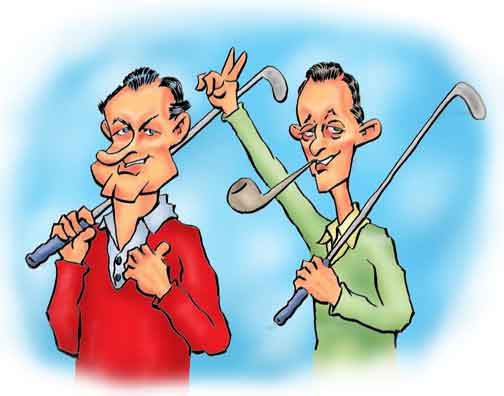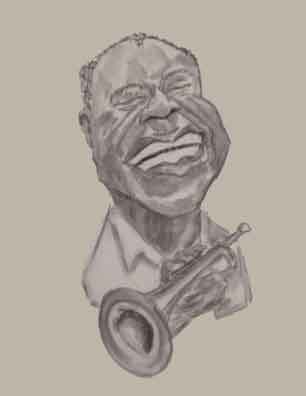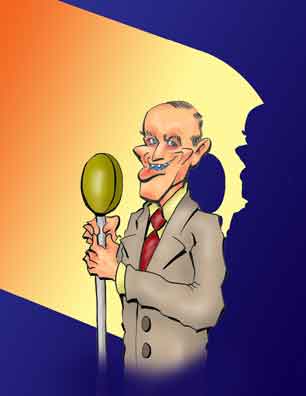
Rudy Vallee
Rudy Vallee

Rudy Vallee
The biggest question about singer Rudy Vallee is just where does the acute accent go? On the first or second e?
You see it both ways: Vallée and Valleé.
And sometimes as we have in the title and caption sans acute: Vallee.
The name, though, is French (Rudy's grandparents were French Canadian), and the name means, yes, "valley". So the proper French spelling is Vallée - that is, with the accent on the first e.
But however you spell his name, Rudy was the first real pop star of the modern era. Specifically, he was the first singing megastar whose success was tied into the new amplification systems and broadcast media.
You see, the advent of electricity into entertainment had a major effect on music. Instead of singing voce piena so as to be heard above the instruments - and today even opera houses often sneak in hidden microphones - singers could sing in a softer, almost conversational manner. Hence, the rise of the crooners.
According to the dictionary, a crooner is:
a singer, typically a male one, who sings sentimental songs in a soft low voice.

Bob Hope and Bing Crosby
Tandem Crooners?
The label is most often slapped on male popular singers from the Big Band Era. Frank Sinatra, Tony Bennett, Al Martino, and of course, Bing Crosby have all been so designated. But if you look at a list of crooners on the Fount of All Knowledge, it seems that anyone who sings solos in tune and doesn't scream into the microphone is a crooner. Even Bob Hope, Ray Charles, Roy Orbison, and Louis Armstrong have been called crooners!

... and Louie?
Although Rudy sang before microphones, he is sometimes remembered as the singer with the megaphone. This non-electronic device - still sometimes employed by college cheerleaders - had two effects. Yes, it directed Rudy's voice out to the audience. But it also produced a higher and hollow timbre which sounded like, yes, Rudy was singing through a megaphone.
Rudy claimed he used a megaphone only briefly - a few months. Perhaps, but there are photographs of him singing through the horn even as he moved into his later years. We do suspect, though, that Rudy's choice of the paraphernalia was for the theatrical effects as much as for projecting his voice.
Born in Vermont in 1901, Rudy's real name was Hubert Prior Vallée. He picked up his nickname because he was a fan of the prolific saxophonist, Rudy Wiedoeft, whose "Saxophobia" even today is an instrumental showpiece. Rudy learned to play the instrument himself and began performing in dance bands. Later he honed his playing and singing skills at Yale.
Rudy sometimes led his band while playing the saxophone but later he set the horn aside to focus on being a band leader and singer. His musical activities must have taken up a fair amount of his time since he remained at Yale until 1927 when he graduated with a degree in philosophy.
Rudy happened to be at the right place in the right time. The first commercial radio station began broadcasting from Pittsburgh in 1920, and in two years there were nearly 600 stations broadcasting to 100,000 sets. By 1925, the number of radio sets had ballooned to over 5 million. The entire US population at the time was only 114 million.
Another turn for Rudy's good fortune was that the 1920's was when the recording industry went electric, replacing the sound-from-the-end-of-a-tunnel technology with what could produce near modern quality. The companies actively sought out talent and in 1927, the first recording of Rudy Vallee and his band, the Yale Collegians, was released. They later recorded for Okeh, and in 1928 Columbia - a big name - signed Rudy up to a contract.
Although Rudy never really abandoned the persona of the Bulldog undergraduate - he was really proud of his Yale degree - it was in 1928 that he redubbed his band the Connecticut Yankees. For over a decade they were one of the more popular groups in America.
So from 1930 to 1950, entertainment in America was partly staying at home and partly going out. Some nights you stayed in and listened to the radio or records. When you wanted to step out, you could go to the movies, go out dancing, or attend sporting events. So with Rudy fitting into three out of four of America's favorite pastimes he wasn't doing too bad.
It was radio, though, that became most popular. After all, once you bought your set, that was all the capital outlay needed. Then you could sit back and listen to songs all evening and not have to even budge from your chair or pay a penny. Radio soon became one of the biggest businesses in the country.
But just who was going to pay for the costs? You not only had the network staff, but there were the performers who were less and less willing to play simply for the honor of being heard by millions of people. Soon the executives saw there was only one way out.
So came that bane of electronic media, advertising. And to keep things simple, the networks developed the system of sponsorship. That is, one company would put up all the money for a program with all the commercials being only for that company's products. The name of the company might even be part of the show's name. So over the years you had the "Camel News Caravan", the "Texaco Star Theater" or even the "Schlitz Playhouse of Stars".
So it was in 1929 that Rudy started hosting on the Fleischmann's Yeast Radio Hour. Despite the name the show wasn't just music, and Rudy invited stars from sports and public life to appear as well. The program was so successful that it got to where Rudy could start telling the networks what to do. He even persuaded the networks to have the black trumpet player, Louis Armstong, host a summer series.
The Fleischmann's Yeast Radio Hour started off with the announcer saying:
The Fleishmann's Yeast Hour, presenting a variety entertainment directed by Rudy Vallee!
Then you'd hear the band playing his theme song, a soft low tune as the audience applauded. Rudy would then sing a brief passage:
| My time is your time. |
| Your time is my time. |
... followed by his signature introduction:
Heigh-ho, everybody. This is Rudy Vallee and Company.
So now we know where Kermit the Frog got his greeting.
After the 1960's, the sponsored programs faded out as production costs became too high for one company to fund an entire series. Instead the networks just sold ad slots to whoever wanted to put up the money. Then when they needed even more money, the networks just started upping the number of ads per program. Eventually when the executives found that programs with nearly 50% ad time actually starting driving the audience away, some shows have returned to single-company sponsorship although how the economics of this works out is a bit of a mystery.

Al Jolson
The Jazz Singer
Of course, radio wasn't the only entertainment around, and audiences would still pay to go to the movies. And yes, Rudy appeared in movies, too. Again his timing couldn't have been better. Al Jolson had appeared in The Jazz Singer which was released a few months after Rudy graduated from Yale. The movie was a hit, and Rudy was a natural for these new musical motion pictures, particularly if he could play a Rudy Vallée type band leader.
Rudy even performed as himself. In 1930 he was featured in a Betty Boop cartoon which, we must admit is not one of the most sterling examples of modern entertainment. The cartoon is based on the song "Kitty from Kansas City" and is a quite dated combination of misogyny and condescension and was no doubt considered hilarious at the time, at least in the male-run entertainment industry.
Consistency was not of much concern for the scriptwriters of the time. In his spoken introduction Rudy mentions how his girlfriend, Kitty, was pretty and then goes on to sing how ugly she is. But Kitty's main attribute was her lack of intelligence or perhaps (more charitably) her lack of education. Rudy, though, doesn't seem that charitable as he sings that "Kitty from Kansas City" is so dumb she thinks that:
Footnote
ein: (German) one. stein: (German) mug for holding beer (literally, 'rock'). Albert Einstein: German born physicist, discoverer of the principle of relativity
Footnote
make love: 2. (dated) Pay amorous attention to (someone). - English Oxford Living Dictionary.
Footnote
no man's land 1. Disputed ground between the front lines or trenches of two opposing armies. - English Oxford Living Dictionary.
Footnote
old maid 1. (derogatory) A single woman regarded as too old for marriage. - English Oxford Living Dictionary.
Footnote
gob (dated, informal) An American sailor. - English Oxford Living Dictionary.
Footnote
Sing Sing Correctional Facility, a maximum security pennitentiary in Ossining, New York.
Footnote
Israelite: A member of the ancient Hebrew nation, especially in the period from the Exodus to the Babylonian Captivity (c.12th to 6th centuries BCE). - English Oxford Living Dictionary").
Footnote
Babe Ruth: Early 20th century baseball player who hit a then record 60 home runs in one season and 714 in his playing career.
Footnote
chorus girl: a young woman who sings or dances in the chorus of a theatrical production (as a musical or revue). - Merriam-Webster's Collegiate Dictionary, 11th Edition, 2004").
Rudy actually appears in the cartoon live and sporting a (false) handlebar mustache which he removes after the "Rudy Vallee" line. We wonder what was the point since Betty's train stopped at "Rudy Valley" and when the music starts (but before we see Rudy), she says "Sounds like my Rudy."
On stage Rudy had a cheerily affable and easy going personality. Off-stage, if the stories be true, he was difficult to work with, had a hair-trigger temper, and on at least one occasion got into fisticuffs due to a disagreement regarding a show. He also garnered a reputation for being a tightwad.
Despite his formidable reputation (or perhaps because of it), Rudy managed to stay active long after his heyday. His later career likely got a boost with the unexpected hit tune, Winchester Cathedral, by the New Vaudeville Band. Despite what some may think, the song was not one of Rudy's standards and was written by Geoff Stephens in 1966. Geoff hired a group of session musicians to cut the demo with John Carter singing the tune. John did not, though, sing through a megaphone on the recording although he did during performances. During the recording session, John simply cupped his hands.
The tune was a hit, winning a Grammy Award, and reaching #1 in Billboard Magazine. The problem was there was no band, so the New Vaudeville Band was actually formed after the record was released. Rudy later recorded the song although he changed the coda from:
| Oh-boh-dee-oh-doh, |
| Oh-boh-dee-oh-doh, |
| Oh-boh-dee-oh-doh-bee-doh-doh! |
... to:
| A-razz-a-ma-tazz! |
| How I love that jazz! |
| Oh-boh-dee-oh-boh-dee-oh-BOH! |
| BOH! |
Rudy himself did have acting ability with a knack for comedy. In the 1960's he had a major role in the Broadway musical How to Succeed in Business Without Really Trying and the subsequent motion picture. He was also a guest actor on a number of popular television series ranging from sit-coms to westerns. One recurring role was as the villainous Lord Marmaduke Ffogg in the 1960's Batman TV series. Rudy continued to appear in clubs, theaters, and on television on into the 1980's.
On July 3, 1986, Rudy was watching the television broadcast of the centennial celebration of the Statue of Liberty. He said to his wife, Eleanor, "I wish we could be there. You know how I love a party". He then took a deep breath and died.
References
Real Men Don't Sing: Crooning in American Culture, Allison McCracken, Duke University Press, 2015.
"Rudy Vallee - American Singer", Jill Amadio, (Alternative Title: "Hubert Prior Vallée", Encyclopedia Britannica.
"Heigh-Ho, Everybody!", Robert Gallagher, American Heritage Magazine, Vol. 23, Issue 4, June 1972.
Oxford Dictionary of English, Third Edition, Oxford University Press, 2010.
"Rudy Vallee, A 'Maine Yankee with a Streak of French Hedonism'", New England Historical Society.
"Can They Hear Me at the Back?", Malcolm Hayes (Host), John Tomlinson (Guest), The Independent, March 27, 2000.
"Yale Collegians (Musical group) - Also Known As: Rudy Vallée and his Yale Collegians", Discography of American Historical Recordings, University of California - Santa Barbara.
"Connecticut Yankees (Musical group)", Discography of American Historical Recordings, University of California - Santa Barbara.
"Single-Sponsor TV Shows Return - The Shifting Media and Advertising Climate Leads Back to 'Branded' Programs", Nick Madigan, Baltimore Sun, December 4, 2006.
"It Was 50 Years Ago Today: 'Winchester Cathedral' by The New Vaudeville Band", Sally O'Rouke, Rebeat, December 6, 2016.
"Kitty from Kansas City (1931)", Mae Questel (Voice), Rudy Vallee (Singer), Max Fleischer (Producer), Fleischer Studios, Paramount (Distributor), 1931, Internet Movie Data Base.
"How the Earlier Media Achieved Critical Mass: Radio; From Dots and Dashes To Rock and Larry King", Mitchell Stephens, The New York Times, November 20, 1995.
"Rudy Vallee 80th Anniversary", Anthony Rudel, Old Time Radio Catalog, October 24, 2009.
"Vintage Sponsor Spots, Television Obscurities, 2009, 2018.
"Rudy Vallee, 85, Crooner and Star for 60 Years, Dies", Michael Seiler, Los Angeles Times, July 4, 1986.
Rudy Vallee", Eve Zibart, The Washington Post, July 5, 1986.
"Rudy Vallee (1901-1986)", Internet Movie Data Base.
Return to Rudy Vallee Caricature